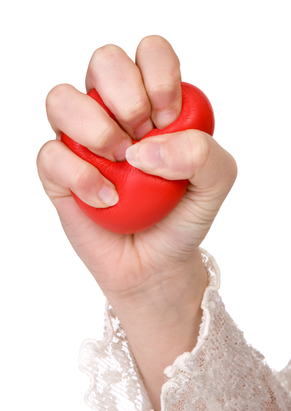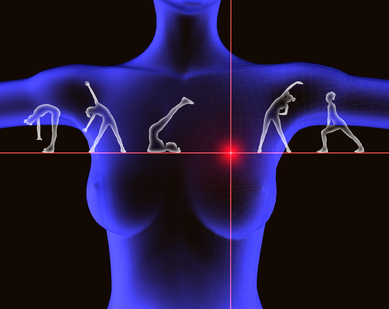Be still my heart: stress, women and heart disease
Heart disease. I have been writing about it for years. And the news doesn’t get much better. According to the American Heart Association, heart disease kills approximately one woman every minute. More importantly, despite the great strides that have been made on the research, treatment and even education fronts, 90% of women in the U.S. have at least one risk factor for heart disease. Yikes!
Allow me to share one of the greatest risk factors, one that you might not be aware of:
Mental stress.
If you are a regular reader of Flashfree, you know that stress can affect mood, sexual desire and symptoms of menopause. And not surprisingly, the association between mental stress and heart disease is well established. However, new study findings published online in the Journal of the American College of Cardiology suggest that mental stress might actually take a greater toll on women’s hearts than on men’s.
In the study (which had originally been designed to assess the impact of an antidepressant on stress-induced heart issues,)male and female participants were exposed to mental stress exercises, including one designed to induce anger. The researchers also evaluated factors that would indicate how the well or poorly the heart was functioning in relation to stress including blood pressure and heart rate as well as reduction in blood flow. Mind you, of the 310 people participating in the study, only 54 were women and this small sample does create certain limitations when it comes to interpreting the findings. However, the report shows that during times of stress, 57% of these women experienced reduced blood flow to their hearts, versus 41% of men. This is not to say that the men dodged the bullet; indeed, men had greater increases in traditional measures such as blood pressure.
Another important finding was the impact of mental stress; women tended to express more negative emotions and experienced a decline in the positive. And, the researchers say that they also observed differences in how the platelets behaved. In the bloodstream, platelets are responsible for stopping bleeding and in aid in clotting. However, they can also clump together to block the flow of blood when the vessels are damaged. In response to mental stress, not only did the blood platelets react more strongly and clump to a greater extent in women than in men, but the women had roughly twice the odds of this occurring.
The researchers say that the findings highlight gender differences in heart disease risk but also suggest that available risk prediction tools may fall short; this is because they don’t measure the full spectrum of mental-stress induced physical and psychological changes. What immediately comes to mind is the recent app launched by the North American Menopause Society, which in addition to promising a more seamless exchange of information and resources between provider and patient, also offers access to cardiovascular risk assessment. That aside, it’s definitely time to change the paradigm. Recent data suggest that death rates from heart disease in women have declined BUT the number has exceeded that of men for the past 20 years. By teasing out the why and what, there may be an avenue to change the narrative. Today, that avenue is mental stress.
The key message is to to be mindful of stress before it stills your heart and steals your life.
Read MoreNewsflash! Two a day diet drinks habit might be harming your heart!
Are you a fan of diet drinks? Do you consume them because they help to keep overeating at bay? Newsflash: you may want to reconsider how diet drinks are actually affecting your health.
Ironically, despite their promise to help you lose weight (and in turn, become healthier) previous studies have linked diet drink consumption to weight gain and an increased risk for metabolic syndrome. Now, researchers presenting at the American College of Cardiology Annual Meeting report that postmenopausal women who consume two or more diet drinks daily may up their risk for cardiovascular disease by as much as 30%. What’s more, the data suggest that the risk from dying from a heart-related event (e.g. heart attack or stroke) might be upped by as much as 50%.
Dr. Ankur Vyas of the University of Iowa evaluated reported dietary habits by almost 60,000 women from the Women’s Health Initiative Observational Study, who at the study’s start, had no signs of preexisting heart disease. While the majority consumed up to three diet drinks a month, about 5% of the women reported drinking two or more daily. And of these women, 8.5% developed heart disease or a composite of different events such as a heart attack or stroke.
The researchers note that increases in these events also occurred in the other groups but in fewer women, so for all intents and purposes, the upped risk is a modest one. Still, even when they factored in other things that might cause heart disease such as BMI, smoking or high cholesterol, women who drank the most diet beverages still had a greater likelihood of developing a heart related event or dying from such event.
It’s too early to say for certain whether or not these findings will bear out closer scrutiny. And, increasingly, experts recommend that people choose the real deal over artificial. However, sugar sweetened beverages may soon be blacklisted across the board. Word to the wise: water trumps diet drinks every time.
Read MoreHave a heart? Move your body!
Ladies, listen up! Roughly one third of your life is spent in menopause and thereafter, which is why it’s so important to manage your health appropriately. One of the greatest issues during this time is heart disease, and after menopause, women are exponentially at increased risk for developing cardiovascular conditions compared to their male peers. Although there are numerous reasons for this increased risk, changes in hormones, namely estrogen, can set the wheels in motion, affecting weight, cholesterol levels and in some women, the way that they process sugar in their bloodstream. The bottom line is that as we lose the protective effects of the ovarian hormones, our cardiovascular system is at increased risk. Moreover, one of the most important consequences is the impact on what researchers refer to as ‘autonomic cardiovascular control,’ i.e. heart rate, pressure in the arteries, the ability of the heart to contract properly and the overall ability of the blood vessels to increase the amount of blood that they hold without significantly increasing blood pressure.
Until now, hormone replacement has been the go-to strategy to modify these heart disease risks. Yet, as we all know, the benefits of HRT with regard to heart disease prevention have been challenged and in fact, some studies show an increased rate of stroke and heart events.
The good news is that researchers are now saying that regular physical exercise may be the answer!
It’s a fairly well known fact that physical exercise can improve quality of life and even reduce the risk and/or overall progression of heart disease. One of the ways that it confers its protective effect is the direct impact on autonomic cardiovascular control mentioned earlier in this post. In particular, study findings suggest that regular physical activity may help modulate heart rate and correct the pressure in the arteries (which tends to bounce all over the place as estrogen declines and we age), although for reasons that are unclear, the same benefits are not seen in women who have undergone early menopause.
A common thread found in Flashfree over the years has been to move your body. Aside from weight, wellbeing and perhaps a balancing of vasomotor symptoms, regular exercise may also act as a buffer against physiological changes that occur as estrogen declines and heart disease risk soars.
There’s no time like the present. Get moving!!!!
Read MoreWednesday Bubble: No mystique, just perseverance
 Time for another menopause downer…followed by some good news! First the downer: declining levels of estrogen during menopause tend to reinforce a decline in the body’s ability to naturally metabolize blood fats and its ability to fight off the ravages of oxygen-free radicals, you know, free roaming oxygen ions that can wreak havoc on the immune system. The result is often an upsurge in heart and other metabolic diseases. You can read more about those conditions here.
Time for another menopause downer…followed by some good news! First the downer: declining levels of estrogen during menopause tend to reinforce a decline in the body’s ability to naturally metabolize blood fats and its ability to fight off the ravages of oxygen-free radicals, you know, free roaming oxygen ions that can wreak havoc on the immune system. The result is often an upsurge in heart and other metabolic diseases. You can read more about those conditions here.
Okay, so the good news: it appears that Tai Chi training may help increase the body’s antioxidant defenses in both pre- and post-menopausal women! In fact, in a study published a few years ago in the Journal of Aging Research, investigators noted a marked change in antioxidant markers normally related to aerobic exercise, as well as a decline in a marker for heart disease risk.
For those of you unfamiliar with Tai Chi, it is an ancient Chinese martial art form that combines breathing with smooth, gentle postures. It may look fairly tame, however, having studied Tai Chi for a short period of time, I can assure you that it’s damn hard. Moreover, despite appearances, it is a weight-bearing exercise that not only strengthens muscles but also is on par with moderate intensity aerobic exercise. It has also been shown to improve mobility, flexibility and balance, improve sleep and overall wellbeing, and even enhance the circulation of blood through the smallest of blood vessels.
I’ve written about the effect of breathing on stress and the body’s stress markers. However, it appears that when Tai Chi is combined with slow and deep breathing exercise (i.e. 6 breaths per minutes) overall benefits are boosted. Indeed, two, 75-minute Tai Chi sessions a week combined with two hours of at home practice appeared to do just what the doctor ordered. These sessions involved 10 min of warm up/stretching, 60 minutes of Tai Chi (45 minutes 18-posture Tai Chi and 15 min Tai Chi Fan Style) and an initial check in period. In addition to the slow, rotational, fluid movements (1.5 minutes per motion), the women participating in the study were taught to control their breathing. Over the eight weeks, they also underwent blood and had physical fitness evaluations.
The findings? Tai Chi training improved balance, flexibility and leg extension strength in all of the women regardless of menopausal status. LDL cholesterol was also lowered. And, as mentioned, markers for antioxidant activity increased significantly while a marker for heart disease risk decreased.
Tai Chi is low impact and is especially valuable for women who may not be physically able to boost their aerobic routines. What’s more, once mastered, it can be practiced in the privacy of one’s own home. Once again, the mind-body connection proves to be pretty darn cool and important to health and wellness! This time, it might take some practice but perseverance rules the day! “There is no mystique to Tai Chi Chuan. What is difficult is the perseverance. It took me ten years to discover my chi, but thirty years to learn how to use it. Once you see the benefit, you won’t want to stop.” – Ma Yueh Liang
Read MoreThe gift of a lifetime…
I’ve been on a bit of a personal rage lately – a rage about weight gain and the ‘pause.
No time like the present to give yourselves the gift of a lifetime: aim for a healthy weight before you hit menopause.
We’ve discussed it time and again on Flashfree; weight gain and menopause go hand in hand like a horse and carriage. And with that weight gains comes an increased risk for developing heart disease, diabetes and the dreaded metabolic syndrome. However, last year, researchers from the University of Ottawa reported that entering full menopause with a healthy body mass index (BMI) actually confers protection.
In the study (which appeared online in the journal Menopause), researchers evaluated and observed 102 premenopausal women for body composition and changes in their cardiovascular health profiles. The women, all of whom were between 47 and 55 years of age, did not smoke, had a BMI between 20 and 29 and had had a stable weight for at least 6 months before the study started, were followed for five years. Each year, the researchers gauged if they had entered menopause, measured body composition (i.e. total fat mass, trunk fat mass and total fat free mass), waist size, the degree of abdominal fat and took blood to examine glucose, insulin and blood fat levels.
The study’s lead researcher, Dr. Denis Prud-homme explains that by simply observing the women and not imposing any structured interventions (e.g. diet or exercise) they were able to assess changes within a more naturalistic environment. At the study’s end, they discovered that despite significant increases in fat mass, visceral abdominal fat, blood glucose and cholesterol levels, most of which were the natural result of hormone fluctuations and aging, the women did not appear to have any declines in their heart or metabolic profiles that would indicate an increased risk for disease. Dr. Prud-homme says that a possible explanation might be that “even if the area of visceral fat is increased, it is still under the critical threshold associated with cardio-metabolic deterioration.” In other words, by maintaing a healthy lifestyle and BMI premenopausally, these women were able to change their risk equations once they fully entered menopause.
The bottom line is that the present you give yourself now will last long into your later years. Exercise. Eat right. And pay attention to your health.
No time like the present. For a present. Give yourself one.
Read More









